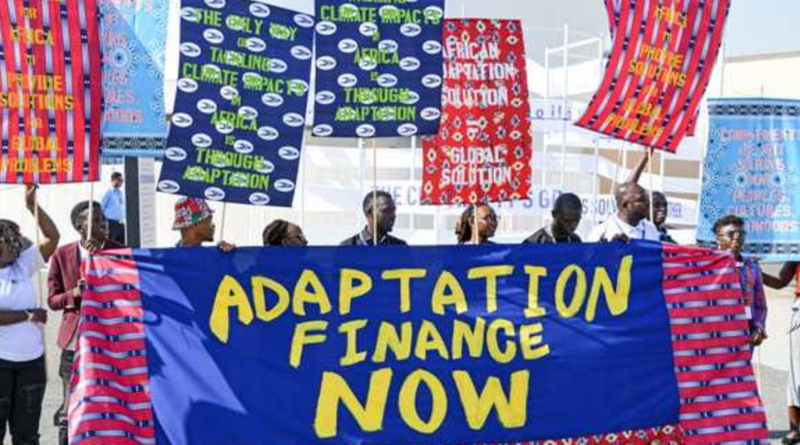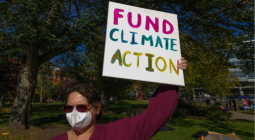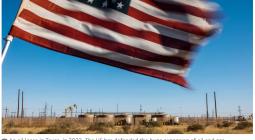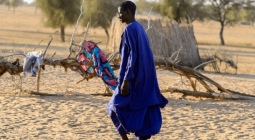Climate Finance: Why Africa must demand climate reparations at COP29

Members of civil societies and non-governmental organisations protest at COP28 in Dubai, United Arab Emirates on December 8, 2023 to demand climate justice. FRANCIS MUREITHI |NATION
What you need to know:
- Decisions made by the African ministers will determine how the continent approaches finance discussions at COP29 in Baku, Azerbaijan.
- As African negotiators prepare for COP29, it is crucial to change the narrative and frame the discussion around what is owed to them. This conversation must also recognise that developed nations are in default on their climate debt
- The lives of millions of people in Africa and elsewhere in the Global South depend on a fair and just climate finance system. A system that prioritises reparations over loans and genuine climate action over greenwashed extraction
As African ministers and negotiators gather this week for the African Ministerial Conference on the Environment (AMCEN) session, climate finance will once again come under sharp focus. Decisions made by the African ministers will determine how the continent approaches finance discussions at COP29 in Baku, Azerbaijan.
Therefore, the ministers, negotiators and experts must put their foot down to set Africa on course for a positive outcome in finance. They must also insist on radical approaches to transform discussions from the current framing that prioritises loans, derisking green investments and market-based solutions to one that facilitates debt cancellation and climate reparations.
Both science and the economics of climate change are clear. Global North countries, also known as developed countries, have exhausted and even exceeded their carbon budget. Meanwhile, with their carbon budget still intact, the world’s most vulnerable countries face the worst evils of climate-induced disasters
The Global North, therefore, owes a climate debt to the Global South (underdeveloped countries) for its historical and ongoing exploitation and destruction of the planet through emissions. A 2023 study by Fanning and Hickel puts climate debt at a staggering $193 trillion. This makes the $700 pledged for loss and damage so far a drop in the ocean. Excluding China, India and the rest of the Global South, Sub-Saharan Africa is owed $45 trillion.
Africa and the rest of the Global South must approach climate finance negotiations with the understanding that the Global North owes them a climate debt. They must pay the debt urgently to demonstrate accountability for their historical culpability.
Wealthy nations cannot continue to offer false solutions such as carbon markets. This amounts to greenwashed colonialism that Africans must vehemently reject, along with the current climate finance framing that is deeply flawed. In its current design, the climate finance framework perpetuates the inequalities it should be addressing.
By offering loans through the World Bank and the International Monetary Fund (IMF), carbon credits and de-risked extractive investments, for instance, the Global North has been exploiting rather than assisting poor nations. These ‘‘solutions’’ not only perpetuate the cycle of dependency but also deepen the climate crisis.
Africa needs genuine and transformative climate finance. Not market-based mechanisms that further entrap African nations in debt and dependency. Climate finance should prioritise climate reparations that enable African countries to invest in food sovereignty, agroecology, renewable energy, clean cooking and public transport infrastructure – all locally led, developed and deployed.
Wrong approach to climate finance
Instead of lending money and imposing austerity measures on poor countries least responsible for global emissions, global financial institutions should be focusing on the historic polluters. They should be compelling wealthy nations to meet their climate pledges and debt obligations by cancelling debt, providing grants and transferring life-saving technologies to vulnerable nations.
In the same breath, these institutions should be advising their citizens to tighten their belts by reducing consumerism, inefficiency and waste.
In terms of the amount of climate finance, developed nations should be paying a minimum of $5 trillion per year to the Global South until 2050. These funds should be seen as a down payment on the broader climate debt owed and directed toward debt cancellation, grant provision and technology transfers – depending on the contributor’s capabilities.
While some countries can cancel debt, others can provide grants. The rest can then focus on technology transfers. Still, the richest among them can contribute to the three categories.
At the same time, arguing that private finance, rather than public finance, will play a bigger role in climate finance is to mislead the world and the process. We cannot overlook the fact that the UNFCCC process is a platform for sovereign governments to negotiate and agree on climate action. There are no formal negotiations with the private sector at COP29, for instance.
That said, governments of wealthy nations are responsible for regulating corporations from their countries and compelling them to contribute to the repayment of climate debt. The burden to enforce climate obligations on multinationals operating in their jurisdictions should not fall on poor and vulnerable countries.
Similarly, the transfer of technology should be enforced by developed countries working directly with patent holders, publicly traded companies and corporations registered in their jurisdictions.
Flipping the script
As African negotiators prepare for COP29, it is crucial to change the narrative and frame the discussion around what is owed to them. This conversation must also recognise that developed nations are in default on their climate debt.
To inspire confidence and the spirit of fairness in the finance conversation, credit rating agencies should downgrade wealthy nations that fail to meet their climate obligations. After all, they downgrade other debtors in default. To leave the conversation at what poor nations must do to secure climate finance, therefore, is to neglect this important part of the conversation.
But even as we pursue payment of climate debt, we must also demand reforms. We cannot afford to continue to have climate negotiations on outdated frameworks that have proven not only ineffective but unjust as well. The lives of millions of people in Africa and elsewhere in the Global South depend on a fair and just climate finance system. A system that prioritises reparations over loans and genuine climate action over greenwashed extraction.
At this critical moment, therefore, Africans must lead the charge in demanding climate reparations rather than climate loans that deepen their economic entrapment. This is not just a financial issue. It is a matter of justice, equity and survival.
Consequently, the historical injustices that underpin the current climate crisis can neither be overlooked nor addressed by simply tweaking existing financial mechanisms. The situation calls for a total overhaul of the current financial system. Today, the Global North’s responsibility extends beyond monetary contributions to include an ethical obligation to rectify the systemic inequalities their actions have caused.
By demanding climate reparations, African nations are not just asking for financial support. They are calling for the demolition of the neocolonial structures that have perpetuated ecological, social and economic harm to the people of Africa. It is a demand for a new global order where the voices and needs of frontline communities in the Global South are prioritised. Where climate justice becomes the foundation of global intergovernmental negotiations.





